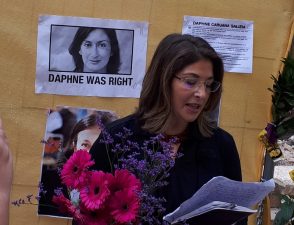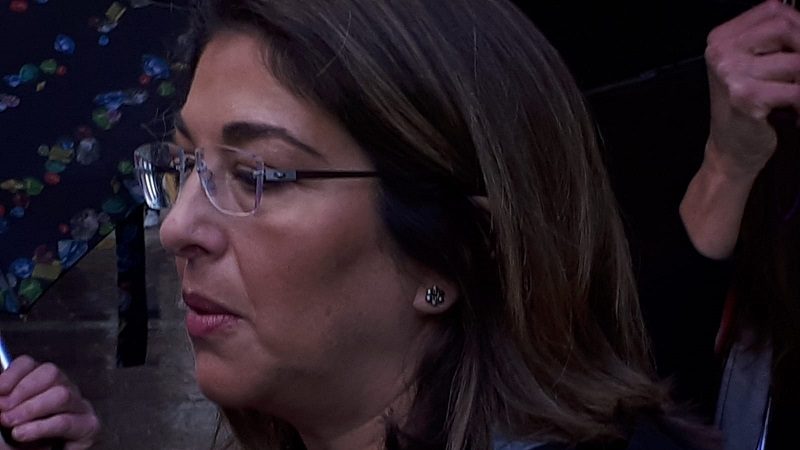There are moments in life where everything makes sense and things seem to come together. Speaking to Naomi Klein was one of them.
We met in Valletta on Friday, the day that she arrived in Malta. It’s immediately obvious that what you know of Klein is what you get.
She is immediately able to adapt the arguments in her books to the local context. Klein is a public intellectual, journalist and activist whose ideas have shaped debate in the environmental field and the politics of the left for more than a decade.
But she rejects the actions of a government that “makes light of an assassination”.
She says the assassination of journalist Daphne Caruana Galizia makes journalists everywhere less safe.
“Powerful political figures making light of these attacks leads to the creation of an atmosphere where violence is acceptable,” she tells The Shift.
To be very honest with you, this reminds me of Donald Trump.
“It [the Labour government] says it’s pro-equality, most feminist, and yet it belittles a crime of this magnitude. To be unwilling to listen to all of the major human rights and press freedom organisations in a unified international call for a public inquiry creates a climate in Europe where all journalists are less safe,” Klein says.
She describes Caruana Galizia’s death as “a gruesome and defiant assassination”. When she was first invited to speak at the Malta Book Festival, she thought of it as a nice experience in the Mediterranean. But as the trip approached, she started to dig deeper.
“I researched Daphne’s case more closely. Then it didn’t seem appropriate for me to just come and speak at the book festival without finding ways of expressing my solidarity with the journalistic community and the human rights community here”.
She adds: “I couldn’t just come to Malta and be a good girl. I mean, have you read my books?” she says, laughing.
Klein is an award-winning journalist and author of international bestsellers, No is Not Enough: Resisting Trump’s Shock Politics and Winning the World We Need (2017), This Changes Everything: Capitalism vs The Climate (2014), The Shock Doctrine: The Rise of Disaster Capitalism (2007) and No Logo (2000).
“What I find most shocking is the tone of top government officials in Malta. It’s shocking enough for such a prominent investigative journalist to be assassinated in this gruesome and defiant way. It would be shocking anywhere in the world, but this is happening in the EU and its European Capital of Culture. I’m still trying to wrap my head around this fact, and then there is this tone of flipness, of casualness, of derision about the case,” she adds.
She says she cannot believe that Justice Minister Owen Bonnici called on his Instagram followers to let him know if he looked better with a beard or not, after his face was placed on the barricade denying public access to the protest memorial for Caruana Galizia.
“This is troubling,” Klein says.

Naomi Klein lays flowers at the protest memorial for slain journalist Daphne Caruana Galizia in Valletta barricaded by the Maltese government to deny public access to the site and wipe out her memory.
She also refers to Valletta 2018 chairman Jason Micallef’s mocking of the dead journalist’s final words, “using them as a punchline for a joke. This is not a comedian, but the chair of Valletta 2018,” Klein stresses.
“To be very honest with you, the government’s reaction here reminds me of Donald Trump”.
She once described Trump as the political equivalent of “fatberg” – a lump of fat and sanitary products that causes blockages in sewage systems. “Horrible, noxious, hard to dislodge,” as she described it.
Klein visited the protest memorial at the barricaded Great Siege square in Valletta on Saturday and paid tribute the slain journalist. She placed flowers and a candle at the site, but they were gone the next day as were those left by citizens and international press freedom organisations over the past year. The Times of Malta had documented government workers removing them in the dead of night.
Klein endorsed PEN International’s call for an independent public inquiry into the journalist’s assassination.
PEN International is among the world’s leading press freedom and human rights organisations supporting the Caruana Galizia family’s call for such an inquiry that would look into the State’s responsibility for the crime.
Klein, herself a journalist exposing corruption, spoke of the need to “shine a light on corrupt practices”.
“It is clear that a decision has been made in Malta to generate economic growth through a series of mechanisms that encourage a certain kind of business that creates a strong likelihood for economic dealings that are not above board and that are taking place here,” she says.
Whether it is the sale of citizenship, the gaming industry and even Bitcoin, these are economic spheres that attract obscurity, she says.
“If you’re going to bet on these types of economic policies then sunlight is your best disinfectant,” Klein tells The Shift. “Investigative journalism shines that light. So for a journalist who was doing that to be assassinated, and for the government to make jokes about it, is extremely dangerous.”
Malta must return to a position where it was a force for good.
As a public intellectual, Klein rises to the famous challenge from Edward Said that “the task for the critical scholar is not to separate one struggle from another, but to connect them.”
She says Muscat’s strategy is not new in terms of leftist governments going full tilt neoliberal. She compares Muscat to former UK Labour leader Tony Blair (who supported Muscat’s re-election).
“But we’re seeing a shift in other countries where it is clear that the crowding of the centre is creating situations that are really ripe for demagoguery because people become so cynical about the incestuous war between the establishment Party and the political elite that becomes the devil’s class – it doesn’t matter who we vote for – that is very dangerous and leading to far right parties gaining ground,” she says.
People are being displaced because of bad policies that ignore our current reality, Klein adds. Climate change is one of the major contributors to that displacement. “This is a world on the move,” she says.
She acknowledged Malta’s contribution to the struggle against climate change in the 1980s, saying “Malta must return to a position where it was a force for good in the world”.
Klein is referring to Malta’s contribution to establishing climate change as “the common concern of mankind” in 1988, in the first UN General Assembly Resolution on Climate Change.
At a time “when climate change was still seen as science fiction”, a young Maltese professor had conceived a strategy to combat a problem which came to the fore several years later.
Under Eddie Fenech Adami’s government, Malta was one of only 12 countries to be invited to a secret meeting to draw up the rules of what would lead to the Kyoto Protocol – the international treaty committing countries to reduce greenhouse gas emissions.
That professor – David Attard – now heads the International Maritime Law Institute located at the University of Malta . Every year some 30 governments from all over the world still send their brightest legal advisers to be trained under his wing.
She warns Malta that as an island nation it will bear the impact of climate change. “We hope Malta can return to its roots and its moral voice and lead on climate change,” she said.
“Large parts of the world are becoming uninhabitable. So we have to go back to values: Do you believe that human life has value? Do you believe in the most basic principles of human rights?”
“If so, why let people drown in your seas?” she asks. “Because then what you’re saying is that these people should just die where they are.”
Klein says we need a strategy that is really about asserting the value of human rights: “We need to stand up to expressions of hate. We need to offer people real economic alternatives. We need to strategise to rehumanise”.














